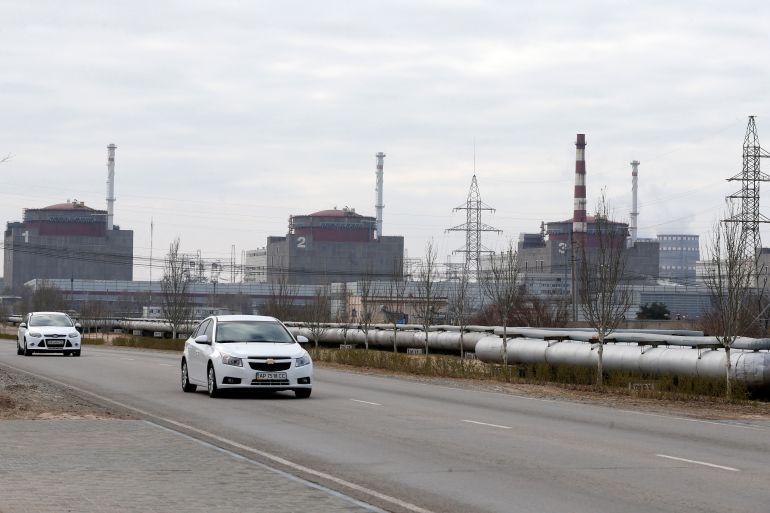Russians advance towards Ukraine’s largest nuclear power plant
The International Atomic Energy Agency has called on the military forces on the ground to refrain from violence near Zaporizhzhia Nuclear Power Plant.

Russian forces are battling for control of a crucial energy-producing city in Ukraine’s south and closing in on the country’s largest nuclear power plant.
Russian tanks and infantry on Thursday entered Enerhodar, a city on the Dnieper River that accounts for about one-quarter of Ukraine’s power generation.
Keep reading
list of 3 itemsPhotos: Shelling continues in Ukraine as Russian forces advance
Why capturing Kherson is important for Russia
Mayor Dmytro Orlov said a big Russian convoy was approaching the city and urged residents not to leave their homes.
The International Atomic Energy Agency (IAEA) said in a statement that Russian infantry troops were moving towards the Zaporizhzhia Nuclear Power Plant, a few kilometres from Enerhodar.
Director General Rafael Mariano Grossi said the situation was “critical” and called on the military forces on the ground to refrain from violence near the site.
“The IAEA continues to consult with Ukraine and others with a view to provide maximum possible assistance to the country as it seeks to maintain nuclear safety and security in the current difficult circumstances,” Grossi said in a statement.
The fighting came as a second round of talks between the two sides yielded a tentative agreement to set up safe corridors inside Ukraine to evacuate citizens and deliver humanitarian aid.
Analysts have said Moscow’s efforts in the south are aimed at severing Ukraine’s connection to the Black and Azov seas, allowing Russia to build a land corridor to Crimea, seized by Moscow in 2014.
Pro-Russian separatists said on Thursday they had “tightened their circle” around the port city of Mariupol, which was being encircled and cut off from electricity as food and water reserves dwindled.
The Russian military said it had seized Kherson, the first major city to fall since the invasion began a week ago. The shipbuilding city of 290,000 people allegedly fell after a three-day siege that left it short of food and medicine.
From Kherson, Russian troops appeared to be directed towards Mykolaiv, another key Black Sea port and shipbuilding centre to the west. The regional governor, Vitaliy Kim, said big convoys of Russian troops were advancing on the city.
A group of Russian amphibious landing vessels also headed towards the port of Odesa, farther west, the Ukrainian military said.
On the eighth day of the Russian invasion of Ukraine, Moscow’s ground advance on Ukraine’s capital in the north appeared to have stalled.
A Russian column of hundreds of tanks and other vehicles still appeared to be stalled roughly 25km (16 miles) from Kyiv, having made no real progress in days. Ukrainian officials said the convoy, which had seemed poised to launch an assault on the capital, has been plagued with fuel and food shortages.
A mass evacuation was ongoing in Kharkiv, Ukraine’s second-largest city, which has come under heavy shelling this week. Russian airborne troops landed in the city on Wednesday, sparking street clashes.
More shelling was also reported in the northern city of Chernihiv, where emergency officials said at least 33 civilians had been killed and 18 wounded in a Russian bombardment of a residential area.
Russia has sought to overpower stiff Ukrainian resistance with firepower, launching hundreds of missiles and artillery attacks on cities and other sites around the country and making significant gains on the ground. According to US defence officials, Russia has fired more than 480 missiles since the beginning of the invasion.
During the second round of talks between Ukrainian and Russian delegations, held in neighbouring Belarus, Russian President Vladimir Putin warned Ukraine that it must quickly accept the Kremlin’s demand for its “demilitarisation” and declare itself neutral, renouncing its bid to join NATO.
Both delegations said that they had agreed to allow cease-fires in areas designated safe corridors and that the two sides would seek to work out the details quickly.
Despite the tentative agreement, Putin told French President Emmanuel Macron he was determined to press on with his attack “until the end,” according to Macron’s office.
The fighting has sent more than a million people fleeing Ukraine. At least 227 civilians have been killed and 525 wounded, according to the office of the UN High Commissioner for Human Rights, though it acknowledged that is a vast undercount. Ukrainian authorities have said more than 2,000 civilians have died.
In a video address to the nation, Zelenskyy praised his country’s resistance and said Russians “will have no peace here. They will have no food,” he said. “They will have not one quiet moment.”